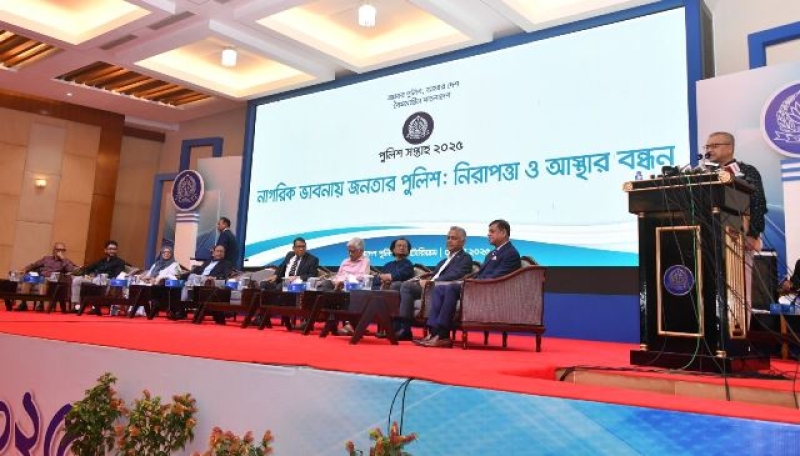- India Sees 9% Drop in Foreign Tourists as Bangladesh Visits Plunge |
- Dhaka Urges Restraint in Pakistan-Afghan War |
- Guterres Urges Action on Safe Migration Pact |
- OpenAI Raises $110B in Amazon-Led Funding |
- Puppet show enchants Children as Boi Mela comes alive on day 2 |
End misuse of police, ensure pol neutrality: Noted Citizens

A session of Police in the thought of citizens was held at Razarbagh marking the Police Week on Thursday 1 May 2025
Dhaka, May 1: Eminent citizens on Thursday called for an end to the misuse of police power at state level.
They also called for the establishment of a politically neutral police force to ensure it becomes a true ‘people’s police’.
They expressed these views at the ‘Police in Citizens' Thoughts’ session, held at Rajarbagh Police Lines as part of Police Week 2025. Educationist Dr. Salimullah Khan was present as the main speaker in the view exchange programme chaired by Inspector vGeneral of Police (IGP) Baharul Alam.
Speakers at the event emphasised that the police force was originally formed as a state apparatus and, as a result, has historically failed to serve as a people-oriented institution.
They said the force has often been used for political purposes, particularly to suppress dissent, leading to public distrust.
“The police must be freed from political influence to become a force for the people,” they said.
Among the speakers were New Age Editor Nurul Kabir, and Acting Chairman of the Department of Peace and Conflict Studies at Dhaka University, Dr. Sajjad Siddiqui, eminent industrialist Sayed Nasim Manzur, Member of Public Service Commission Prof Chowdhury Saima Ferdouse, former IGP Md Abdul Qaiyyum and Nurul Huda, and Election Reform Commission Member Dr Zahed Ur Rahman.
Besides, teachers, journalists, religious leaders, writers, athletes, musicians, filmmakers, economists, writers, labour leaders, and citizens from different walks of life were present at the meeting.
Former police chiefs attending the session acknowledged that despite being given independence, the force has often been misused for personal gain and political interests. They stressed that the police must take the lead in transforming itself into a politically neutral, citizen-serving institution.
Dr. Salimullah Khan said, there are police in every state in the world. Police are a part of society. The decline in the popularity of the police in our country should be discussed openly.
He said, the distance between the police and the people should be reduced. The police cannot be made to stand against the people.
Nurul Kabir said, when the state becomes oppressive, it does not allow the police to be the people's police.
He said, for the police to be the people's police, they must keep several things in mind. They must have the intelligence to realise right or wrong.
Dr. Zahed Ur Rahman said that police members will have to fight to refrain from following the unjust orders of political parties.
Former IGP Abdul Qaiyyum said we all want to be independent but do not like freedom. Many want to be slaves. This hypocrisy should end. We have to come out of it, he added.
Former IGP Nurul Huda said the political leadership have to give the police an opportunity to work independently.
He said the relationship between the people and the police is "chase and counter chase". This culture needs to be changed, he added.
Inspector General of Police (IGP) Baharul Alam, in his remarks, said that moral strength—not force—is the greatest weapon.
He called for collective support in the journey toward a more ethical and people-friendly police force.
Special Assistant to the Chief Advisor Md. Khoda Baksh Chowdhury, retired police officers, all Metropolitan Police Commissioners, Range DIGs and Police Superintendents were present at the meeting. - unb

